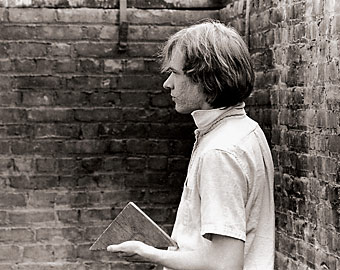 Wild Combination: A Portrait Of Arthur Russell is as apt a film title as you’ll find. Russell—an avant-garde composer, singer/songwriter, cellist and disco producer—was a gay, flannel-wearing converted Buddhist from Oskaloosa, Iowa. He collaborated with Allen Ginsberg, David Byrne and Phillip Glass, among many others, in a thriving New York City art scene in the ‘70s and ‘80s. Wild combination, indeed.
Wild Combination: A Portrait Of Arthur Russell is as apt a film title as you’ll find. Russell—an avant-garde composer, singer/songwriter, cellist and disco producer—was a gay, flannel-wearing converted Buddhist from Oskaloosa, Iowa. He collaborated with Allen Ginsberg, David Byrne and Phillip Glass, among many others, in a thriving New York City art scene in the ‘70s and ‘80s. Wild combination, indeed.
Russell died from AIDS in 1992 at age 40. His vast music catalog—he left behind thousands of tapes of partially finished songs—was largely overlooked until recently, when a series of reissues, compilations and tributes were welcomed by a new generation. After learning about Russell from a friend, New York-based filmmaker Matt Wolf felt an instant, visceral connection to his music before even hearing it. The seemingly contradictory character—the Iowa farm boy who becomes a Buddhist and downtown scenester—was fascinating.
“That image was enough to intrigue me, but then of course, hearing Arthur’s music really sealed the deal,” says Wolf. “Arthur’s music is so intensely intimate and personal that I wanted to know more about the artist.”
With a background in experimental filmmaking, Wolf initially sought to make a purely visual interpretation of Russell’s vivid, gracefully hypnotic music. The focus changed after Wolf reached out to Tom Lee, Russell’s longtime partner, who still lived in the East Village apartment the two shared next door to Ginsberg. Wild Combination, which had its world premiere in February at the Berlin Film Festival (screenings are expected stateside throughout the year), explores Russell’s artistry and background. He was an unhappy teen with severe acne who kept to himself and read Timothy Leary. Wolf traces Russell’s steps from a San Francisco commune to New York, and he includes footage of some of Russell’s early performances.
Living in New York in the ’70s, Russell became a fan of the Ramones, the Modern Lovers and Talking Heads. (He played cello on an early version of “Psycho Killer,” which didn’t go over so well.) Despite the apparent pretentiousness of some of Russell’s cello-fueled endeavors, he yearned for commercial success. Then along came disco. Under the name Dinosaur (one of several monikers he used), Russell wrote and produced “Kiss Me Again,” the first disco single released by Sire Records. Russell later co-founded Sleeping Bag Records, which issued a variety of hip hop and oceanic dance music in the early ’80s. Regardless of the times, Russell’s music (even tracks created for the dance floor, such as hypnotic 1981 hit “Go Bang”) holds up surprisingly well today.
“Arthur was always looking toward the future, and there’s a futuristic quality to his music,” says Wolf. “When I listen, I don’t sense a time or a place; there’s a transcendent aspect to the music.”
Russell is affectionately recalled by a host of friends and fans, including Ginsberg, Glass, Lee and Jens Lekman (who contributed a cover of “A Little Lost” to last year’s Four Songs By Arthur Russell tribute EP). Perhaps most touching, Russell’s parents were interviewed in Arthur’s childhood home in Iowa.
“I wouldn’t call Arthur an underdog, but I think he was always on the brink of success,” says Wolf. “More than anything, his collaborators, family and partner wanted to see him actualized or recognized in this way because Arthur wanted that. I can only imagine how rewarding and validating it must be to have this renaissance happening more than a decade after Arthur’s death.”
With the 71-minute Wild Combination, Wolf was able to help reconstruct Russell’s life and times for increasingly admiring audiences.
“It’s never easy to make a visually driven, archivally dense film about a gay Buddhist cellist from Oskaloosa,” he says. “And I’m still sometimes shocked that we pulled it off.”
—John Elsasser






